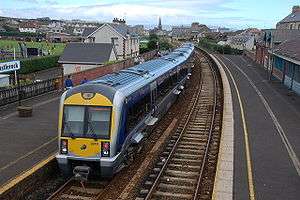Belfast–Derry railway line
The Belfast–Derry railway line (referred to as the Derry~Londonderry Line by NI Railways[1]) runs from Belfast to Derry in Northern Ireland. The line is double-track on the short section it shares with the Belfast-Larne railway line, but is composed mainly of single track from Monkstown up to Londonderry Waterside station with passing points at Antrim, Ballymena, Ballymoney, Coleraine and Bellarena.
Current service
Services on the Derry~Londonerry Line run on an alternating pattern to and from Belfast. The trains alternate hourly between a service from Great Victoria Street to Londonderry Waterside (and vice versa), and a service from Great Victoria Street to Coleraine, which then continues to Portrush via the Coleraine-Portrush railway line.
On weekdays, stations between Great Victoria Street and Coleraine have an hourly service in both directions, with each outbound train alternating between a service to Londonderry Waterside, and a service to Portrush, except for some peak time trains which terminate at Coleraine. In the other direction, all trains run hourly to Great Victoria Street, with the exception of some late night and peak time services, which terminate at Belfast Central. Stations between Coleraine and Londonderry Waterside are served every two hours in each direction.
On Saturdays, the service remains much the same throughout the line as during the week, except for a reduction in peak-time services.
On Sundays, all trains run between Great Victoria Street and Londonderry Waterside, with the exception of the first and last services of the day, which start from or terminate at Coleraine. Only seven trains run each way on the Derry~Londonderry Line on Sundays.[2]
Any passengers travelling to Portrush on Derry-bound services, or to Derry on Portrush-bound services, have to change at Coleraine station.
Previous operations
Prior to 2001 and the reopening of the Bleach Green line, services operated via Crumlin, Glenavy, Ballinderry and Lisburn. The reopening of the Bleach Green line resulted in shorter journeys between Belfast and Londonderry. A skeleton service continued on the Lisburn-Antrim line until 2003, when the line and its stations were closed. This section of railway is now used solely for driver training, unless emergency diversions are required.
Recent history and future
In August 2011 it was planned to reduce services on the Coleraine to Londonderry section to five services, in each direction on weekdays, to facilitate safety improvement works during 2012. A refurbishment of the line was due to commence in April 2012, however the £75 million that it was to cost, was unavailable. This resulted in opposition from supporters of the section who feared that the line would be permanently closed down.[3]
In October 2011, after years of uncertainty, DRD minister Danny Kennedy relocated funding from the A5 dualling project to the railway upgrade project, allowing for a 3 phase upgrade, which commenced in July 2012.
Phase 1 saw the line close for 9 months to completely relay two sections (Coleraine to Castlerock; and Eglinton to Londonderry) of the route, extending the life of the remaining section by converting the currently jointed track to continuous welded rail, elimination of wet spots, and essential bridge repairs. This was completed on 24 March 2013, and new timetable changes have resulted in a morning train reaching Derry before 9am for the first time since Northern Ireland Railways took control of the network in the 1960s.
Phase 2 has seen the passing loop removed and the 'up' track lifted at Castlerock, replaced with a new loop further down the line at Bellarena station. New signalling has been introduced, and the signalboxes at Castlerock and Londonderry Waterside closed, with the line no longer operating by token. The intention was to introduce an hourly service between Belfast and Derry,[4] however services currently remain at their previous two-hourly level.
Phase 3 will include the complete relay of track between Castlerock and Eglinton by 2021 delivering half-hourly services.[5]
Other future plans for the Londonderry line include the reinstatement of the double line from Antrim to Ballymena, the doubling of the track from Monkstown to Templepatrick, and possible relocation of the route terminus in Londonderry.
Railway engineering feature
Coleraine has a bascule bridge for the railway over the navigable River Bann.[6] Just after Castlerock station there are two tunnels created during an event known as the Great Blast in October 1845. Castlerock tunnel is 668 yards long and is the longest operational railway tunnel in Northern Ireland. After passing through a short opening trains pass through the shorter Downhill tunnel which is 301 yards in length.[7]
Signalling
Signalling on the line from Great Victoria Street to Slaught level crossing (just south of Ballymena station) is controlled by the Belfast Central control terminal. From Ballymena, the signalling and level crossings are controlled by the Coleraine signal cabin. Following the signalling upgrade in 2016, the line north of Coleraine is no longer controlled by electric token, instead being centralised in the Coleraine signalbox. The signalboxes at Castlerock and Londonderry Waterside, which previously controlled the token system, have now been closed. Most of the Belfast to Londonderry line is controlled by colour light signals, but Castlerock station still boasts its original somersault-type semaphore signals.
Rolling stock
Following the complete withdrawal of the NIR Class 80 and NIR Class 450 trains, the line is now served by a combination of NIR Class 3000 and NIR Class 4000 diesel multiple units.
References
- ↑ "NI Railways Timetable – Derry Line, Winter 2012" (PDF). Translink. Retrieved 3 January 2013.
- ↑ Northern Ireland Railways (March 2013). "NIR Service 3 Timetable". Translink. Retrieved 19 March 2013.
- ↑ "Kennedy calls for more money for Londonderry rail link". BBC News. 25 August 2011.
- ↑ "Londonderry Line" Andy Milne, RailStaff, May 2012.
- ↑ "Derry rail upgrade right on track". Retrieved 11 July 2013.
- ↑ http://www.movablebridges.org.uk/BridgePage.asp?BridgeNumber=1100
- ↑ "Archived copy". Archived from the original on 11 March 2012. Retrieved 2013-03-29.
External links
| Wikimedia Commons has media related to Belfast–Derry railway line. |
